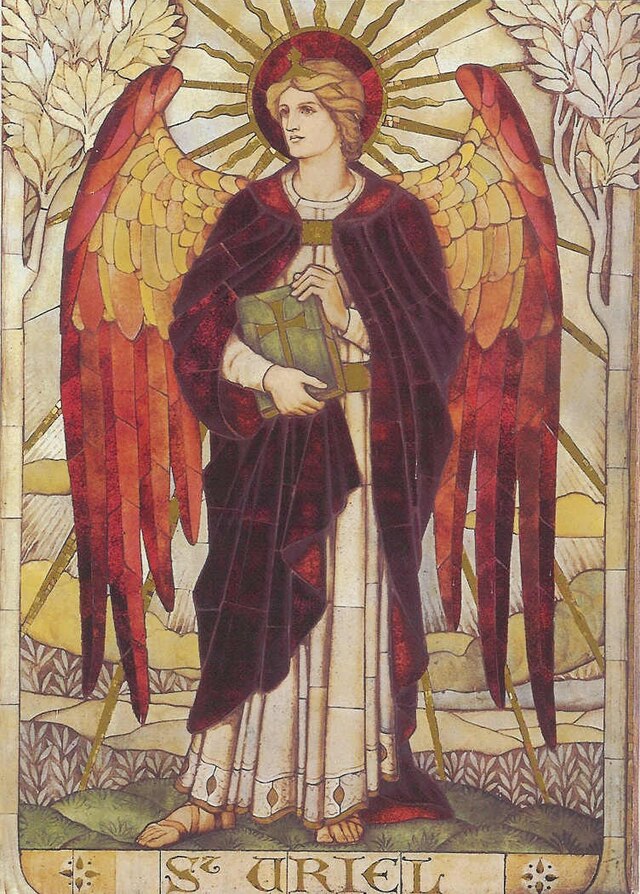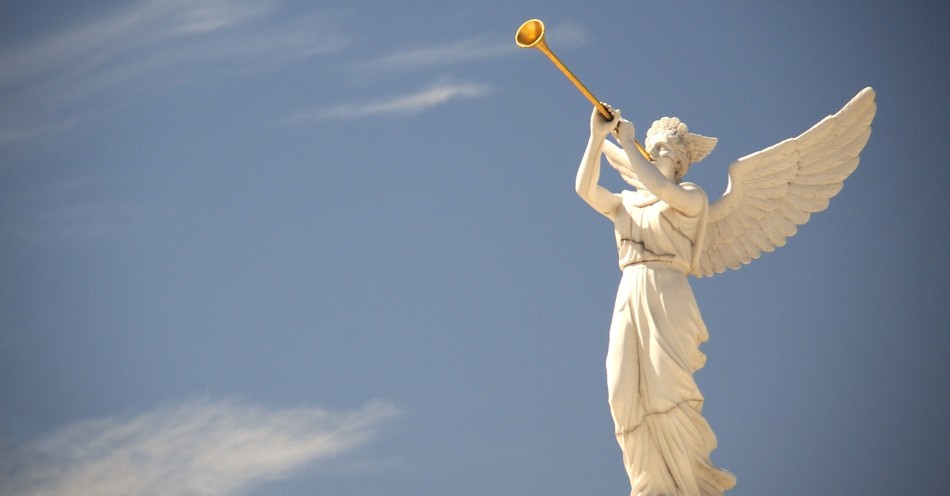In biblical literature, the Archangel Uriel is considered to be the angel of wisdom, who shines the light of God’s truth to those who seek information, solutions, or even require wisdom. He is commonly portrayed carrying a book or a scroll which symbolize wisdom.
The name “Uriel” is derived from the Hebrew אוּרִיאֵל and means “God is my light.” It is also translated as “Fire of God.”
Other names for Uriel are Oriel, Auriel, and Uzziel, however, he is also known as the “Prince of the Sun,” the “Angel of the Presence,” the “Archangel of Salvation,” and the “Patron of Prophecy,” and more.
What is the Origin of the Archangel Uriel?
It is a simple truth that the Bible reveals very little information regarding angels, and by extension, archangels.
However, there are 15 literary texts called the Apocrypha, which provide accounts of the Archangels, but are not a part of the biblical canon, so as such, these entries must be taken with a grain of salt.
These apocryphal texts include the Book of Tobit, the Book of Enoch, the First and Second Book of Esdras, The First and Second Book of the Maccabees, The Book of Wisdom, and more.
In the Book of Enoch, seven angels are defined as Archangels and are listed by name, of which Uriel is included. Archangels are superior in rank to the other types of angels such as cherubim, Seraphim, Principalities, and Powers and therefore lead them. Uriel is also mentioned by name in the Testament of Solomon.
The seven archangels mentioned in the Book of Enoch lamented over the toll that man’s sins had waged over them, which resulted in human suffering and a broken world.
In response, God assigned some of these angels to watch over mankind and guide and protect them. Uriel was one of these.
Ancient texts such as the Tobit 12:15-22 and Jewish and Kabalistic writings mention the existence of six further Archangels. Here are their names: Michael, Gabriel, Raphael, Jophiel, Raguel, and Lucifer.
Note: These apocryphal books, which were believed to have been written between 200 BC and AD 400. However, they were eventually disregarded for their lack of divine conception and incompatibility with biblical principles.

Photo credit: James Powell and Sons of the Whitefriars Foundry, St Uriel, St John's Church, Warminster, Wiltshire, Public Domain
Is the Archangel Uriel Mentioned in the Bible? What About Apocryphal Texts
The Archangel Uriel is not mentioned by name in the Bible, however, there are numerous depictions of him in the Apocrypha
Contrarily, in Isaiah 63:9, Uriel is speculated to be described to be in the presence of God:
in all their distress. It was no messenger or angel but his presence that saved them; in his love and in his pity he redeemed them; he lifted them up and carried them all the days of old.
Uriel the Archangel is not mentioned specifically in the Bible. However, apocryphal texts give Uriel accreditation for certain biblical events. Here are a few examples of them:
- Uriel is said to be the angelic guardian who protected the Tree of Life with his flaming sword after Adam and Eve had been driven out of the Garden of Eden.
- Uriel is accredited as being the angel who checked that the doorposts of the Israelites had been marked with blood during the Passover.
- In the Book of Enoch, Uriel is sent by God to warn Noah of the upcoming flood (Enoch 10:1-4).
- Uriel, along with Michael, Gabriel, and Raphael are the four Archangels who protect the four corners of the globe. Uriel is said to protect the south, Gabriel the north, Michael the east, and Raphael the west.
Can l Believe That Uriel Exists if He Is Not in the Bible?
In 2 Timothy 3:16, it states, “that all Scripture is breathed out by God and profitable for teaching, for reproof, for correction, and for training in righteousness.”
The fact that angels are mentioned in the Bible is evidence that their presence, might, and servitude to God is an invaluable teaching resource and additionally provides us with a unique insight into the divine realm.
Although Uriel is not mentioned by name in the Bible, nor can one ascertain that He is the angel behind the events mentioned in the Apocrypha, this literature still proves to be an interesting read, but not to be taken as Scripture.
Does the Archangel Uriel Play a Role for the Modern Christian?
For some Christians, in particular those from Anglican and Eastern Orthodox churches, Archangel Uriel is considered a saint. According to Catholic tradition, Uriel is considered the patron of confirmation.
Whatever our belief or standpoint may be in regard to angels, let us remember that the ultimate divine being is God. He is the Most High, the Name Above all Names, the Creator of all beings, including angels.
As glorious and supernaturally powerful angels may be, let us worship God first and foremost, for He is worthy of our praise!
What Are All the Names of Angels in the Bible?
What Are Archangels in the Bible? How Many Archangels Are There?
What Are the Apocryphal Books, and Do They Belong in the Bible?
Photo Credit: ©iStock/Getty Images Plus/mstroz

Madeline Kalu is an Australian Christian writer and the co-founder of Jacob’s Ladder Blog and The Proverbs 31 Home. She is also the co-author of the “My Year of Miracles 2024” journal, which encourages a daily reflection on the miracles that God performs in our lives throughout 2024. Madeline lives in Germany with her husband Solomon and the family’s two cats who were rescued from the Ukrainian war zone.



